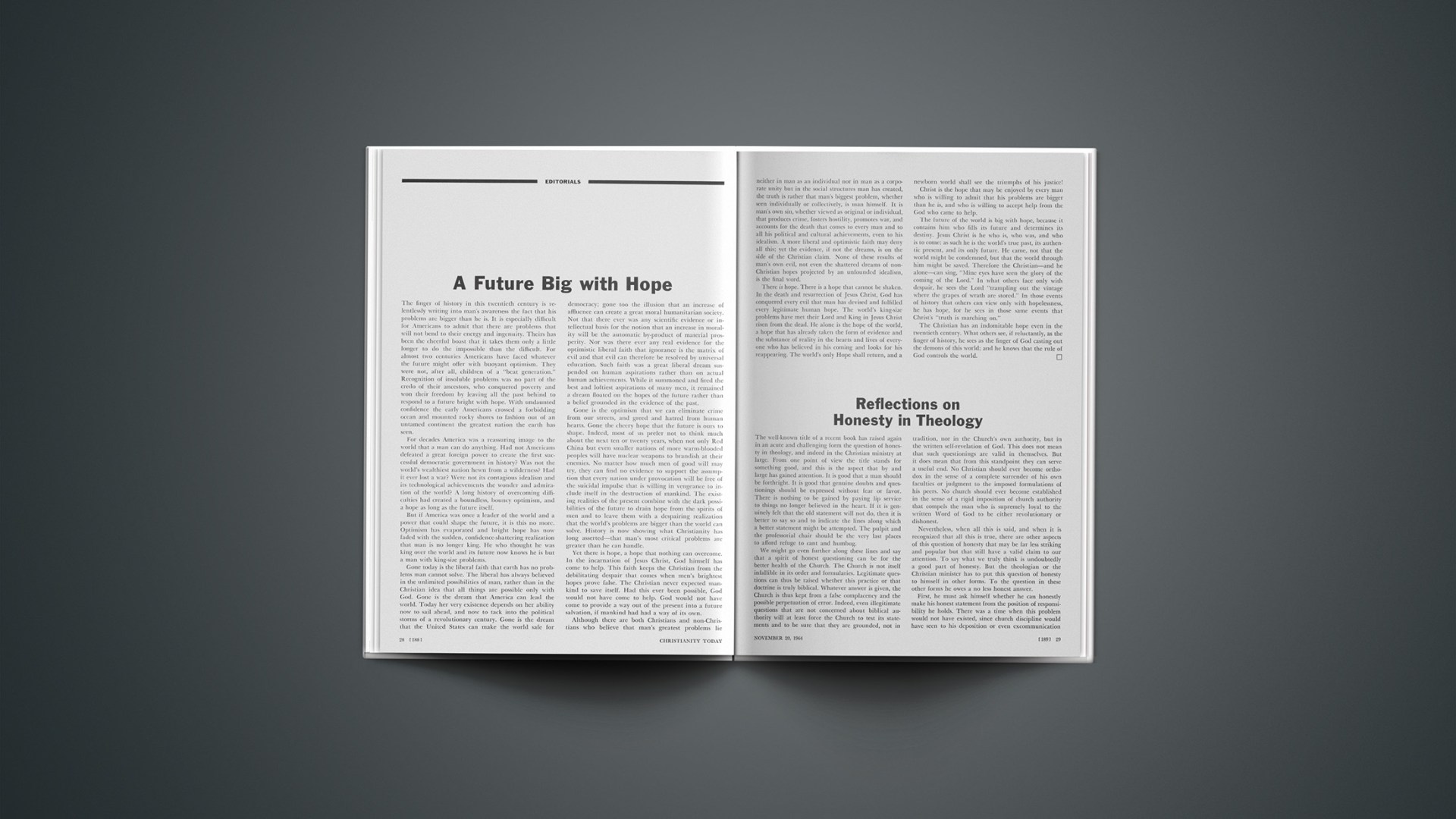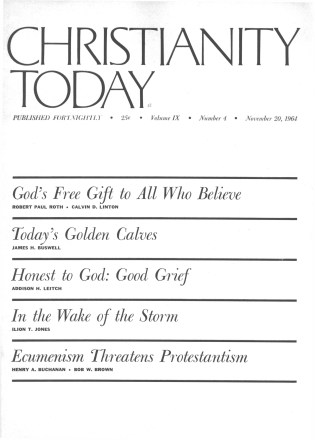The well-known title of a recent book has raised again in an acute and challenging form the question of honesty in theology, and indeed in the Christian ministry at large. From one point of view the title stands for something good, and this is the aspect that by and large has gained attention. It is good that a man should be forthright. It is good that genuine doubts and questionings should be expressed without fear or favor. There is nothing to be gained by paying lip service to things no longer believed in the heart. If it is genuinely felt that the old statement will not do, then it is better to say so and to indicate the lines along which a better statement might be attempted. The pulpit and the professorial chair should be the very last places to afford refuge to cant and humbug.
We might go even further along these lines and say that a spirit of honest questioning can be for the better health of the Church. The Church is not itself infallible in its order and formularies. Legitimate questions can thus be raised whether this practice or that doctrine is truly biblical. Whatever answer is given, the Church is thus kept from a false complacency and the possible perpetuation of error. Indeed, even illegitimate questions that are not concerned about biblical authority will at least force the Church to test its statements and to be sure that they are grounded, not in tradition, nor in the Church’s own authority, but in the written self-revelation of God. This does not mean that such questionings are valid in themselves. But it does mean that from this standpoint they can serve a useful end. No Christian should ever become orthodox in the sense of a complete surrender of his own faculties or judgment to the imposed formulations of his peers. No church should ever become established in the sense of a rigid imposition of church authority that compels the man who is supremely loyal to the written Word of God to be either revolutionary or dishonest.
Nevertheless, when all this is said, and when it is recognized that all this is true, there are other aspects of this question of honesty that may be far less striking and popular but that still have a valid claim to our attention. To say what we truly think is undoubtedly a good part of honesty. But the theologian or the Christian minister has to put this question of honesty to himself in other forms. To the question in these other forms he owes a no less honest answer.
First, he must ask himself whether he can honestly make his honest statement from the position of responsibility he holds. There was a time when this problem would not have existed, since church discipline would have seen to his deposition or even excommunication if necessary. The temper of our time is against such action. But this sharpens the aspect of individual responsibility. There is undoubtedly a dimension of honesty which demands that the sham of an accepted but unfulfilled responsibility be put off with the sham of a professed but unaccepted conviction.
Secondly, it must be allowed that this is a corporate as well as an individual matter. No one suggests that the man who, wishing to replace what he regards as outmoded or ill-founded forms, clings to a responsible position, is deliberately or consciously dishonest. Nor does anyone deny him the precious right of individual judgment. The only point is that responsibility in the church is corporate as well as individual. On certain matters a church has to accept common standards, and it has a right to expect that its ministers will honor these standards and work at their amendment or reform only within the constitutional procedures of the church, not by unilateral action. If a responsible individual feels compelled by his own conscience to take a stand that does not conform to the corporate standards, does he not have a duty of honesty either to act nonetheless within the established order or to relinquish his office and to make his more violent protest from a position of freedom as an ordinary member of the congregation?
Thirdly, cases may even arise where the radical convictions expressed are so extreme that they conflict with the very essence of the Christian faith according to its plain scriptural formulation. When this is so, the problem arises whether the honest man who wishes to speak honestly has any honest right to make a profession of Christianity at all. Is it not the part of honesty to say quite plainly that Christianity is wrong or only partially right, that from within some individual source of authority a better opinion may be offered and a better way proposed? And if we are to talk of honesty, is it not essential that when we make forthright utterances we should have the ultimate readiness to face up to their ultimate implications?
Fourthly, there is the point that when the issues are stated in this sharper form, much of what passes for honest statement may be shown to be no more than honest questioning. But if this is so, is it not better to be quite honest and to say so? After all, Martin Luther, who was not in any case dealing with defined doctrines, began by putting up theses for academic disputation and even at Worms still admitted that he was open to persuasion from Scripture or by clear reasons. If a man is convinced that the biblical or historic statement is wrong, that is one thing. If he is not sure in face of new problems of thought or learning, that is another. But if he is not sure, then the wider problems of honesty come back with full force. Can a man be a responsible teacher of others if he has really no measure of clarity himself? May it be that he has made a completely wrong beginning and ought to have the honesty to admit this and go back to the primary classes in Christian instruction? Could there even be an element of pride in this particular honesty as distinct from the honest humility of the believer?
Finally, the question may be asked whether there is any greater honesty in doubt or unbelief than there is in faith. Only too often it is glibly assumed in some circles that if a man is honest he will have to come out with doubts or heterodoxies. Only too often it is implied that the man who conscientiously fulfills his responsible ministry is in some sense engaged in intellectual and practical humbug. But there is basically no reason why, in this or any other century or culture, there should not be honest believers who in all humility and yet also in all integrity genuinely mean what they say. There is basically no reason why those who accept and fulfill a position of trust on the making of a solemn confession should not do so with serious conviction of heart and sincerity of dedication. We do not deny that there is honest doubt and honest unbelief. But surely, there is also a less glamorous but no less solid and abiding honesty—the honesty of honest faith.










